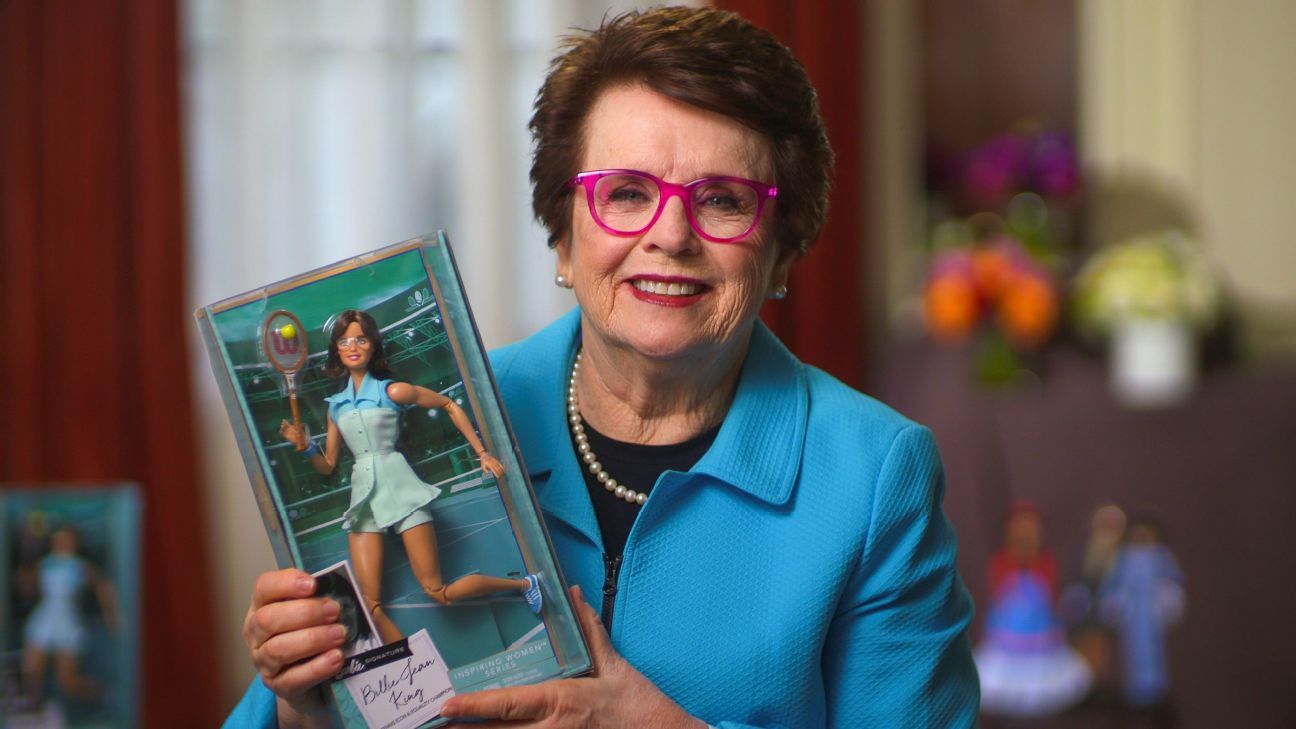In 1973, Hall-of-Fame tennis player Billie Jean King famously beat Bobby Riggs in the Battle of the Sexes exhibition match. Bringing in a record 90 million television viewers, the tennis match is one of the most memorable moments in women’s and sports history. For King — who has 39 Grand Slam titles (including singles, doubles and mixed doubles), 20 career titles at Wimbledon and consistent number one rankings — it’s not just about the memory, but her overall impact on the sport and beyond.
Throughout her career, King campaigned for equal prize money in the men’s and women’s games. In 1971, she became the first woman athlete to earn over $100,000 in prize money. But, significant pay disparities still existed. In ’73, before the notable exhibition match, King created the Women’s Tennis Association and became its first president. In this role, she successfully lobbied for equal prize at the U.S. Open and forever changed the women’s game.
She also founded the Women’s Sports Foundation in an effort to further opportunities for women in sports. In 2009, King received the Presidential Medal of Freedom by President Barack Obama for her advocacy work on behalf of women and the LGBTQ community. If all of these accomplishments and accolades weren’t enough, on Thursday, King was honored by having a Barbie created in her likeness.
In 2018, Barbie debuted the “Inspiring Women” series to honor modern and historic role models who have paved the way for generations of girls to dream bigger. This initiative is part of Barbie’s “Dream Gap Project,” which raises awareness around the limiting factors that prevent girls form reaching their full potential in comparison to boys. Since the “Inspiring Women” series debut, role models such as Amelia Earhart, Katherine Johnson, Frida Kahlo, Rosa Parks and Sally Ride have been made into dolls. This year, King joins jazz singer Ella Fitzgerald and founder of modern nursing Florence Nightingale. Each doll in the series features authentic clothing and unique accessories, in addition to educational information about the honoree’s contributions to society. This is the first time a professional athlete will be honored in the “Inspiring Women” series, although a handful of other athletes like Ibtihaj Muhammad and Misty Copeland have been honored in the past by the Barbie Role Models program.
King talked to espnW about having a Barbie made in her likeness, the future of women’s tennis and if Serena Williams will tie Margaret Court’s record of 24 Grand Slams.
This interview has been edited and condensed for clarity.
espnW: How does it feel to have a Barbie in your likeness?
BJK: I’m really excited because it’s the first one in the Inspiring Women’s line for sports. I want girls to dream about being athletes and also just being strong. One thing sports teaches us is to really understand our bodies and it gives us strength, not only physically, but it gives us strength emotionally and mentally. Tennis has allowed me to have a platform, a global platform. I know I’m really fortunate to have had this opportunity to try to fight for equality for everyone.
espnW: What were your initial thoughts when you were contacted for the Inspiring Women series?
BJK: My initial thought — I asked them if they have anybody else in sports yet. They said no, you’d be the first in the Inspiring Women’s series. I’m sure there will be many more after me in this collection. There are so many great athletes, women athletes, that are contributing to making the world a better place. I think imagination is so powerful. I think it’s really wonderful. I used to have dolls. I was pretty old by the time Barbie started in 1959, I was 15, but I used to have a lot of dolls and my brother and I liked them and we used to talk about them and imagine things and in the other corner was my bat, ball and basketball.
espnW: Barbie has also been criticized for a lack of diversity and body types in their dolls. What does it mean to reconcile with this shift in narrative, as Barbie tries to diversify its dolls?
BJK: They’re really trying to make sure there’s a doll for everyone. Everyone needs to be able to identify with at least one or more of the dolls. I think that everyone evolves over time. I think the world’s in a very different place when I was born. Barbie is really setting the tone and trying to be a leader in it and trying to make sure that they take care of a lot.
It helps to have different Barbies because we’re all different and if you can see it, you can be it. If you’re five years old and say you’re African-American, it’s going to be good if you can see yourself in one of these dolls. If you love sports, like I did at five, I was already a jock and I would’ve wanted to see another sportsperson. I used to admire other women like Wilma Rudolph, Babe Didrikson, all kinds of women that I used to admire. I used to admire men, too, because there were more of them. It was easier. I also think it’s important kids learn history because the more you know about history, the more you know about yourself. More importantly, it’ll help you shape the future.
espnW: How does it make you feel to know that there is a new generation of tennis players like Coco Gauff and Sofia Kenin making their mark in the world of tennis?
BJK: It really makes me happy because we have the most depth we’ve ever had. Anybody can beat anybody right now. Sofia Kenin just lost in the first round in Dubai, but she just won in Australia. Right now, we have everything. You’ve got lefties, righties, you got tall, short. The racket’s such an equalizer. It’s unbelievable. It’s all about contact point, pathway and contact points. I think we’re really in great shape for the future. It’s fantastic.
espnW: And what’s a tennis conversation without Serena talk. What do you think of Serena Williams’ chances to tie Margaret Court’s record of 24 Grand Slams?
BJK: I’ve known Serena since she was 10. I’ve known her and Venus forever. And I do talk to her on and off about this. But the thing when you’re older, and I played until I was 40, is that you have to get so fit. I played Tracy Austin at 17, I’m 39, that means two times what, 17 is 34? At twice her age, I’m still older, so that’s what she has to deal with. And that’s the question I have to ask her — get fit and get tough. You’re going to have to play more tournaments. You’re going to have to pick and choose just right. But if you’re not fit today, especially in tennis, it’s so demanding now. So that’s the question I’d have to ask myself if I were her. Am I fit enough to do this? Otherwise, would she? Absolutely. In the old days, she could hit it harder and she’d win. That’s not going to win today. These kids love the fast-paced ball. I would love it, if she would tie the record.

